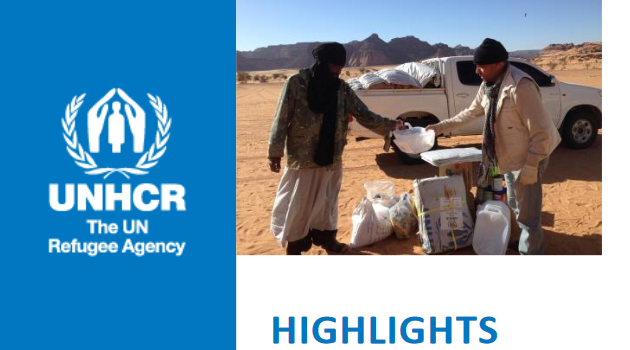An updated factsheet from the UN High Commissioner for Refugees (UNHCR) says that there are more than 800,000 "persons of concern" in Libya.
HIGHLIGHTS
- 5,440 Refugee families received core relief items so far in 2016
- 3,436 Internally displaced families received core relief items so far in 2016
- 269 Monitoring visits to detention facilities were conducted so far in 2016
- 7 Capacity building events organized for government and NGO representatives so far in 2016
- Population of concern A total of 814,219 persons of concern
- Funding USD 23.9 million requested
WORKING WITH PARTNERS
- UNHCR is a member of the United Nations Country Team (UNCT) and Humanitarian Country Team (HCT) in Libya. As part of the Humanitarian Response Plan (HRP) 2015-2016 for Libya, UNHCR leads the Protection Working Group (PWG), the Shelter/NFI working group and co-leads the Detention Task Force with the International Organization for Migration (IOM) under the HRP for Libya’s Refugee and Migrant Response chapter.
- UNHCR collaborates with Libyan authorities and has set up a forum to strengthen Libya’s ability to respond to rescue at sea incidents and provide humanitarian assistance to the persons rescued or intercepted. The group brings together with UNHCR the Libyan Coastguard, the Port Security Department, the Directorate for Combatting Illegal Migration (DCIM) and the Libyan Red Crescent Society (LRC), international actors, such as the IOM and the International Medical Corps (IMC).
- UNHCR works with several national and international NGOs in Libya. For its refugee response and detention monitoring, UNHCR works with two international NGOs, Cooperazione e Sviluppo (CESVI) and the International Medical Corps (IMC), in Benghazi and Tripoli. UNHCR also works with Acted, IMPACT and Mercy Corps to provide core relief items and financial assistance to internally displaced persons (IDP) and to assess migratory pattern across Libya. Finally, UNHCR has three partnerships with national NGOs: Arkan for Development, the Libyan Organization for Development (LOD) and the Libyan State Humanitarian Relief Agency national (Libaid).
The full factsheet can be found here.
(Source: ReliefWeb)





